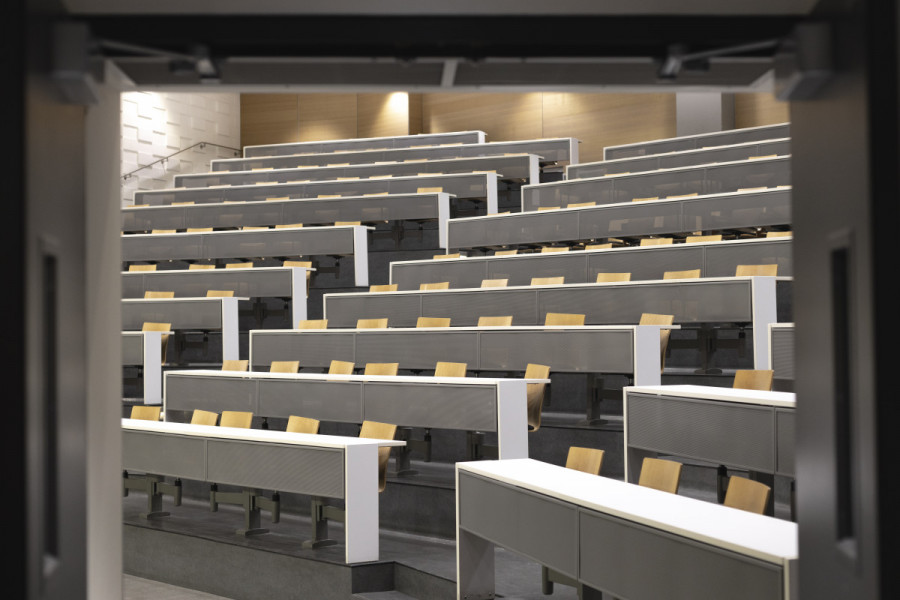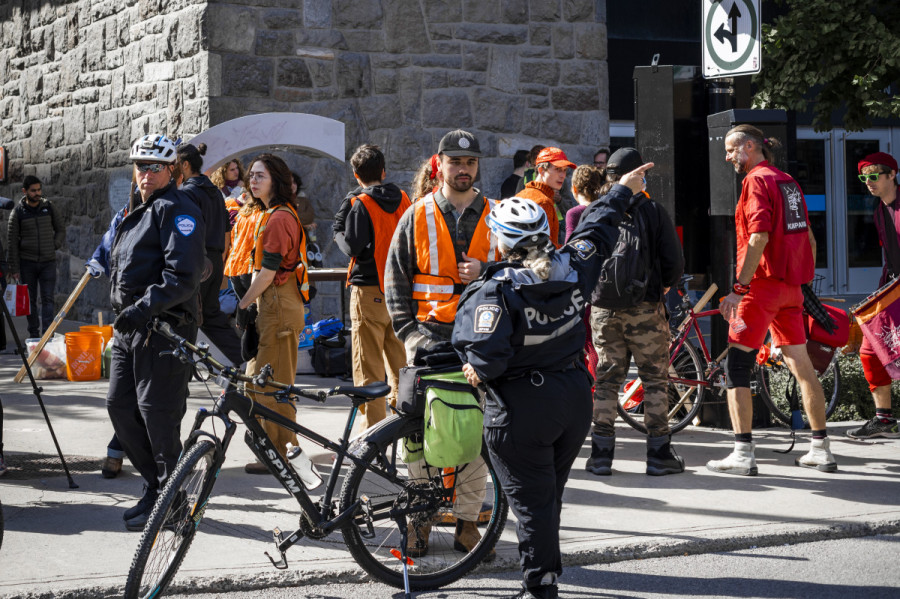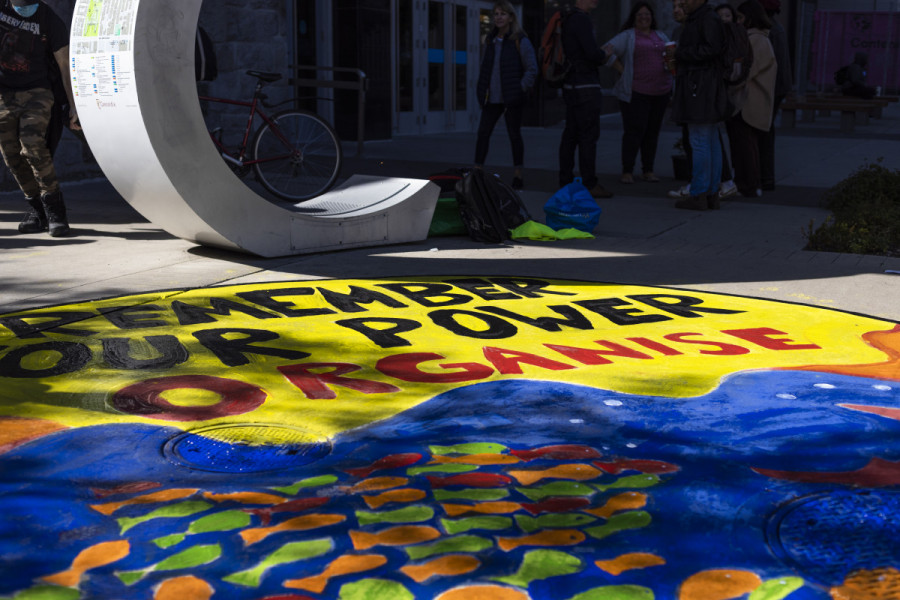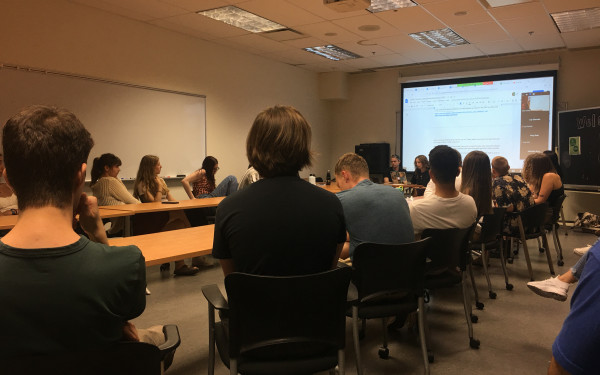Big Picket Energy
Arts and Science Students Strike for Fall Reading Week
Partially blocking a door and sitting in a hallway in the middle of the Loyola campus’ central building, Rami Zemouri and Erik Hristev were playing a game of chess.
The two students, both executives in the Concordia Undergraduate Biochemistry, Chemistry and Physics Society, were not simply shooting the breeze on a Tuesday morning. Their ultimate gambit—picketing their physics class—required even more strategizing.
Moments earlier, three security guards entered the hallway after being called by picket-line-crossing biology students in a neighbouring classroom. “Our physics picketing was planned, but the biology students spontaneously joined in,” Zemouri said of the biology students who formed their own picket line in front of their classroom.
As security arrived to oversee the situation, the line-crossers found a way to bypass picketers and sneak into their biology class. Once the guards assisted the biology professor into the room, the next-door physics professor arrived onto the scene. Only one student showed up to the physics class—the others skipped in solidarity.

Between Oct. 3 and Oct. 7, over a dozen student associations within the Arts and Science Federation of Associations participated in a strike for a fall reading week. Classes were picketed, but multiple activities and workshops were planned across both campuses.
Although a fall reading will be implemented in 2023, the strike was a symbolic measure for student action and immediate change on campus. In lieu of a reading week, the Fall 2022 semester merely had a reading day on Oct. 12.
Hundreds of students participated in the strike in one way or another.
On Oct. 4, the first official day of the strikes, the Loyola campus was quieter than usual. Akira Oikawa, vice-president of communications within the Communication Studies Student Association, was patrolling the CJ building’s hallways.
“I’m so shocked that nobody’s here,” Oikawa said. “I’ve only seen about three people show up to their classes so far,” he added. With the help of ASFA Communications Coordinator Payton Mitchell, Oikawa set up a coffee station in the lounge area for fellow strikers.
Organizing and planning the strike was no easy feat, according to ASFA executives. Just days before the strike week began, Mobilization Coordinator Ashley Torres contracted COVID-19. Without her presence, other coordinators, like Mitchell, amped up their involvement.
“If Concordia wants to give us Zen Dens and therapy dogs, we’ve got a bouncy castle for them.” — Payton Mitchell
Oct. 4 was a hectic morning for strikers at the downtown campus. At 11:30 a.m., dozens of demonstrators attempted to block off street corners near de Maisonneuve Blvd. and Bishop St..
ASFA General Manager John Hutton and CSU Sustainability Coordinator Sean Lévis, who acted as the strike’s police liaison, were immediately approached by SPVM officers once protesters started blocking streets. According to multiple sources within ASFA, nobody had been in contact with the police to let them know how their event would be planned.
Grabbing a megaphone, ASFA Academic Coordinator Lily Charette encouraged the crowd of painters and protesters, hoping to boost morale. The police forced the painters to relocate to the sidewalk, where two smaller paintings were made.
Across Concordia, classrooms in multiple buildings were tagged with leaflets made by the different member associations on strike. MAs tailored their pamphlets to their liking, placing them on the doors where classes were supposed to occur.
Besides picketing classrooms, multiple events were planned throughout the week. On Oct. 5, “all-nighters,” gatherings from 7p.m. to 12 a.m., took place at both libraries. At the Webster library downtown, ASFA Internal Coordinator Scarlet Guy handed fresh cups of tea to passersby, explaining the purpose of the strike.

At Loyola’s Vanier library, organizers handed out slices of pizza to participants. They had laid out poster boards for students to write out their biggest issues with the university. One student wrote about overbooked mental health services. Another student added on: “Same thing for me. There was no place anytime [to seek professional help]. Their alternative was [a] 24h suicide hotline.”
On Oct. 6, MA executives erected an inflatable obstacle course on the Loyola Quad. “Access Mental Health Services Here,” a parody of Concordia’s lack of mental health support for students, was written on a sign next to the obstacle course. “If Concordia wants to give us Zen Dens and therapy dogs, we’ve got a bouncy castle for them,” said Mitchell.
A rainy Friday capped off the fall reading week strike, concluding the demonstrations. While this year’s strike was organized by Arts and Science undergraduates, next fall semester’s official reading week will be Concordia-wide.
This article originally appeared in Volume 43, Issue 4, published October 12, 2022.





_600_375_90_s_c1.jpg)
_600_375_90_s_c1.jpg)
__600_375_s_c1.png)